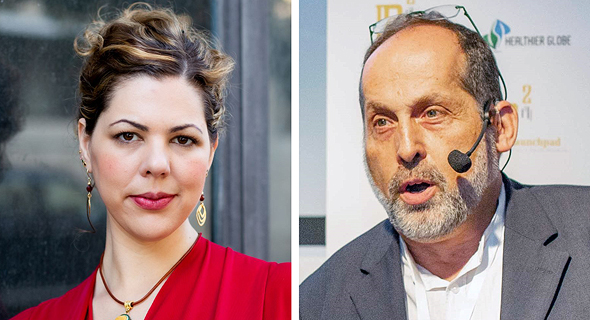Opinion
Big in Taiwan: Israel's tech sector's connection to “Asia’s Silicon Valley”
"The Israeli Startup Nation and the Taiwanese Scale-Up Nation complete each other, and the combination of the two will accelerate the development and growth of both," write Meital Margulis Lin and Rani Shifron
In order to foster innovation, the current Taiwanese government has been operating a "5+2" program and invests many resources in innovative industry, including the Internet of Things, life sciences, green energy, robotics and homeland security. Innovation in agriculture and cyclical economics were added at a later stage.
 Rani Shifron (right) and Meital Margulis Lin. Photo: Michal Deri Weiman and Netti Levy
Rani Shifron (right) and Meital Margulis Lin. Photo: Michal Deri Weiman and Netti Levy Taiwan has made headlines over the last two years thanks to its success in dealing with the coronavirus pandemic. While most countries in the world went into lockdown upon the outbreak of the pandemic, the markets in Taiwan remained open and continued to operate as usual. The Taiwanese economy even showed positive growth, with the momentum growth shown by the Taiwanese economy in 2021 expected to continue this year. Last month, the National Development Council of Taiwan updated the growth target for 2022 to 4.6%, a higher number than that set in November 2021, which was 4.15%. The forecasts for continued growth are based on an increase in domestic investment, strong exports and a continued increase in private consumption. Alongside this, the global chip crisis has highlighted the global dependence on Taiwanese chipmaker TSMC. The company was established in the 1980s with the aim of building a knowledge-and-technology-intensive industry, now producing over 50 percent of the world's chips.
The Israeli-Taiwanese connection
Israel and Taiwan have trade relations, which according to data from the Ministry of Economy and Industry - Foreign Trade Administration amounted to about $1.7 billion in 2020 - a moderate increase over the past five years. In October last year, Israel hosted the Taiwan and Israel 13th Joint Business Council, held online due to Covid restrictions. Thanks to the council, agreements were reached for cooperation in a variety of areas, from water technologies to renewable energy. In addition, as part of the innovation promotion in Taiwan's ecosystem over the last two years, the Taiwan Ministry of Economy has begun operating a number of innovation programs to nurture ties and technological cooperation between Taiwan and Israel. The programs, which accelerate the entry of companies into the Taiwan “Silicon Valley”, are run at the Startup Terrace Innovation park, which is supported by the Small and Medium Enterprises Administration of Taiwan’s Ministry of Economic Affairs. The center provides a business operations base for the participating companies. Following the programs’ success in Israel, Taiwan has announced expansion into five other countries - Canada, Australia, the United Kingdom, the Netherlands and Sweden.
The Taiwanese government’s strong focus on an innovation ecosystem, the investments, the economic growth, and the ties between Israel and Taiwan, all provide an opportunity for Israeli companies to play a role in Taiwan's global growth and lead the Asian "Silicon Valley". Over the last two years, the Taiwan Ministry of Economy has been operating several programs aimed at fostering ties and collaborations between the Israeli and Taiwan ecosystems. The objective of these programs is the entry and activity of Israeli high-tech companies into the Taiwanese market, and from there into other Asian countries. The Israeli Startup Nation and the Taiwanese Scale-Up Nation complete each other, and the combination of the two will accelerate the development and growth of both.
Taiwan and Israel have quite a few similarities - both small in size, with an advanced and developed economy, a democratic regime based on a capitalist economy, and both dealing with challenges such as a lack of natural resources and complex historical relations with their neighbors. In addition, Taiwan and Israel have a long and present tradition and heritage. In both cultures, one can find traditional values which exist today, in the 21st century, and go hand in hand with progress, modernity and technological developments.
Alongside the similarities, and the Taiwanese people’s great appreciation for Israeli “Chutzpah”, audacity, and innovation, it is also important to remember the cultural differences and understand them. One must pay attention to commitment, reciprocity and trust, and bring to the table a lot of flexibility, perseverance and patience. The more the Israeli and Taiwanese business parties strengthen and reinforce their personal networks, the more the joint construction of the Taiwan Silicon Valley will be accelerated.
- Taiwanese giant Foxconn leads $25 million investment in Israel’s Powermat
- A Better Place for directors and officers?
- Competition: What is it good for?
Building relationships, "Guanxi" 關係, is an art in itself. Since the last two years have deepened the challenge of building Guanxi, one of the things that can help establish meaningful and long-term business relationships is the assistance of a local partner, a person, organization, or company, located in Taiwan. A local partner will be able to bridge cultural differences, make his personal network in the Taiwan ecosystem available to Israeli companies, assist throughout the process of building relations, negotiating, and signing agreements. Through the use of a local partner, Israeli companies will be able to accelerate their entry into a market which is experiencing tremendous growth, flooded in investments, and focused on establishing itself as a hub of East Asian markets and global activity.
Meital Margulis Lin is the Founder & CEO of Taiwanit and Rani Shifron is the CEO of Israeli consulting firm Healthier Globe, and head of the IP² programs in Israel.



